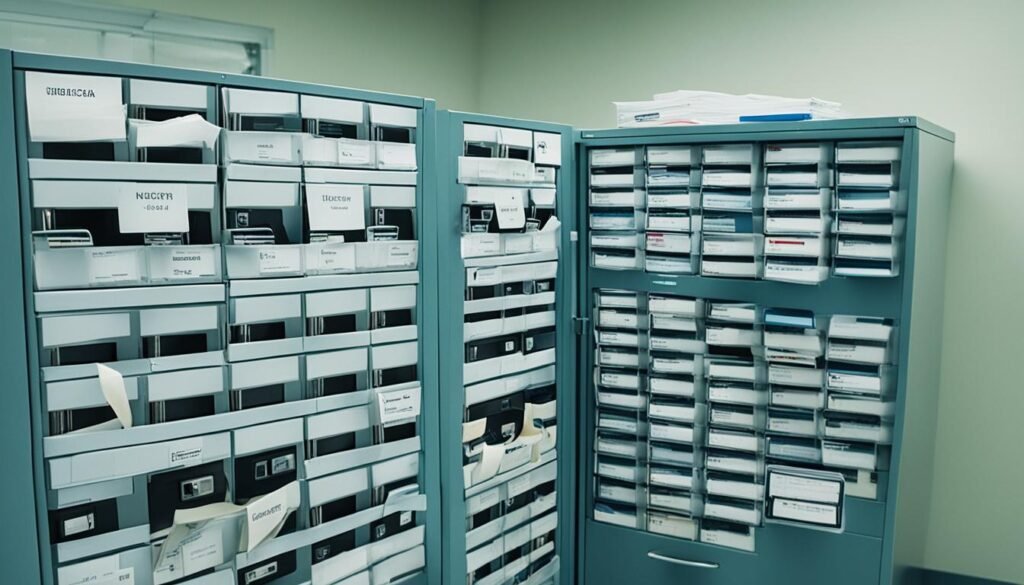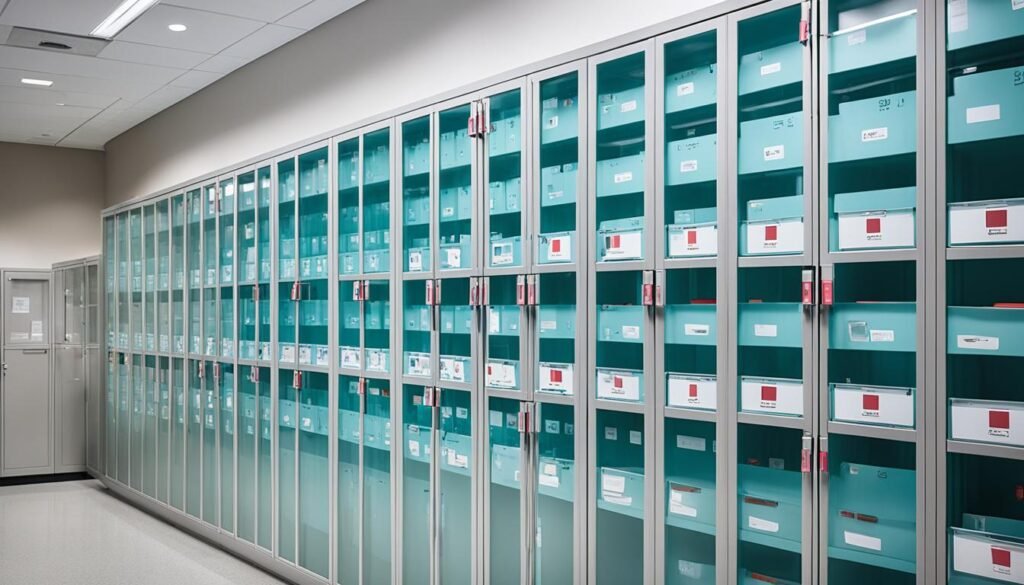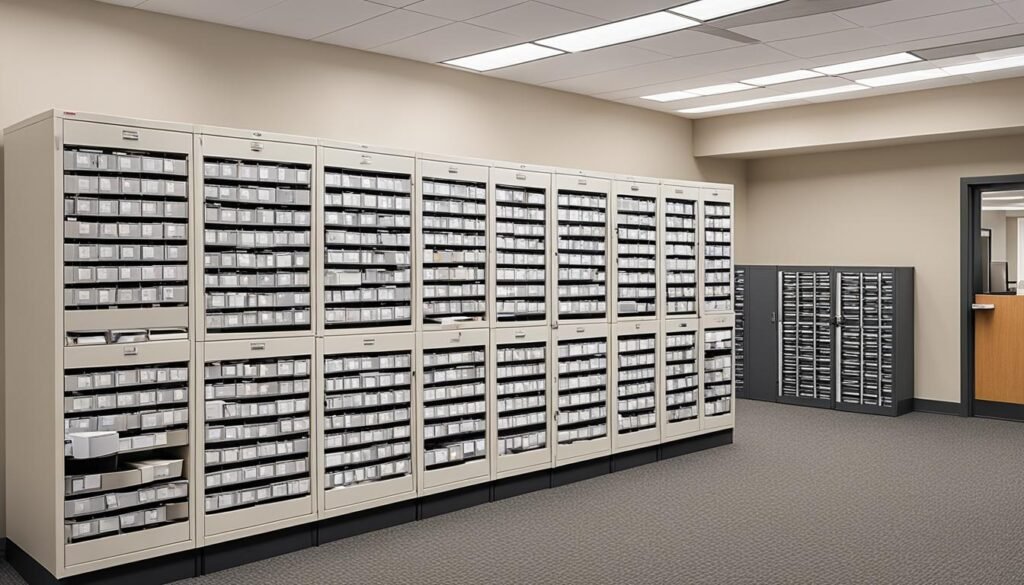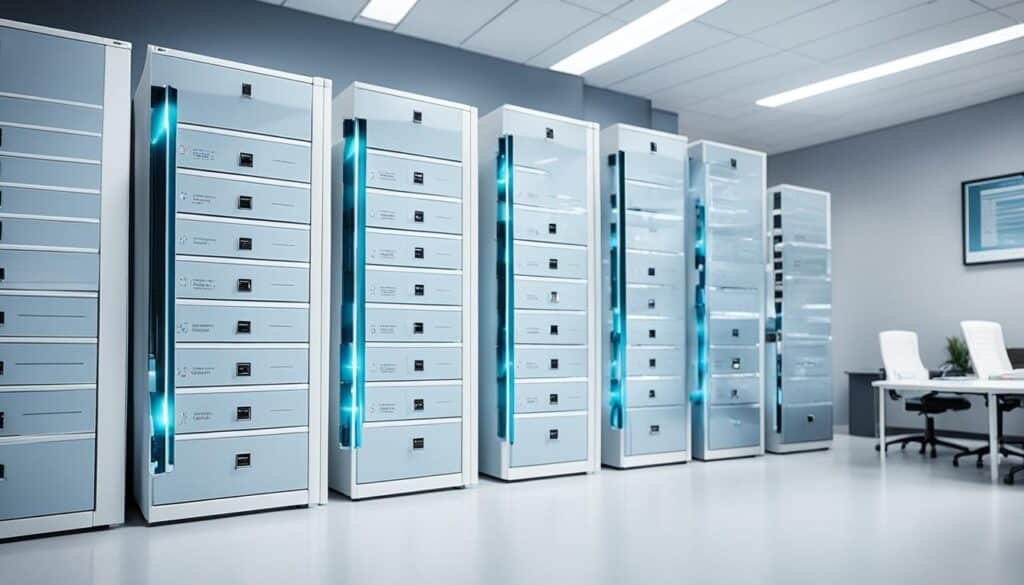In today’s digital age, medical records play a crucial role in providing quality healthcare. Access to accurate and up-to-date health records is essential for healthcare providers to make well-informed decisions about patient care. It is also important for individuals to have the ability to access their medical information for personal use or to share with other healthcare professionals.
However, the storage and management of medical records come with unique challenges. The authorization, release of information, and confidentiality of these records must comply with the Health Insurance Portability and Accountability Act (HIPAA) to protect patient privacy and ensure data security.
At Detroit Medical Records Scanning, we understand the importance of secure storage and easy access to medical records. Our full-service solution provides healthcare facilities with efficient and HIPAA-compliant record management systems. With our expertise, healthcare providers can ensure their records are readily available while maintaining patient privacy.
Key Takeaways:
- Medical records are essential for providing quality healthcare and require secure storage and easy access.
- HIPAA compliance is crucial to protect patient privacy and ensure data security.
- Detroit Medical Records Scanning offers full-service solutions for efficient and HIPAA-compliant record management.
- Our expertise helps healthcare providers maintain patient privacy while ensuring records are readily available when needed.
- Efficient storage and easy accessibility of medical records enhance the quality and efficiency of healthcare services.
How EHR Storage Works
Electronic Health Records (EHRs) play a crucial role in modern healthcare. When healthcare providers input patient information into their EHR systems, a digital record is created. This record contains vital data about the patient’s medical history, treatments, medications, and more.
EHR storage refers to the process of securely storing these digital records for easy access and collaboration among healthcare providers. There are two main methods of EHR storage: cloud-based and on-premises.
Cloud-based EHR storage involves storing the digital records in secure cloud servers. This offers several advantages for healthcare providers. First, it allows for seamless access to patient information from anywhere, at any time. Healthcare professionals can retrieve and update records on the go, enabling more efficient patient care. Additionally, cloud-based storage facilitates collaboration among healthcare teams, as multiple providers can access and contribute to a patient’s record simultaneously.
On the other hand, some healthcare providers prefer on-premises EHR storage. This involves storing the digital records in data centers located within the healthcare facility itself. On-premises storage offers a higher level of control and security, as the data remains within the provider’s infrastructure. It also ensures compliance with any specific regulatory requirements regarding data storage and privacy.
Both cloud-based and on-premises EHR storage have their own advantages and considerations. The choice between them depends on factors such as budget, security concerns, and specific needs of the healthcare provider.
EHR storage plays a vital role in patient care and safety. By securely storing and maintaining accurate digital records, healthcare providers can easily access critical information, make informed decisions, and deliver timely and personalized care. Moreover, EHR storage helps minimize liability risks by ensuring the confidentiality and integrity of patient data.
Benefits of Cloud-Based EHR Storage

Cloud-based EHR storage offers numerous benefits for healthcare providers and facilities. By leveraging cloud technology, medical records can be securely stored, accessed, and shared, leading to improved transparency, collaboration, and cost savings. Let’s explore the advantages of cloud-based EHR storage in more detail.
Transparency and Collaboration
Cloud-based EHR storage enables easy access to patient records from any location with an internet connection. This accessibility promotes transparency among healthcare providers, facilitating seamless collaboration and better-informed decision-making. Care teams can quickly review and update patient information, ensuring coordinated care and improved patient outcomes.
Cost Savings and Total Cost of Ownership
Opting for cloud-based EHR storage offers significant cost savings compared to traditional on-premises storage solutions. With cloud storage, there’s no need for expensive hardware infrastructure or ongoing maintenance costs. Instead, healthcare providers can access secure cloud servers and pay for storage resources based on their needs. This shift in pricing models results in a lower total cost of ownership and enables healthcare facilities to allocate resources more efficiently.
Scalability and Flexibility
Cloud-based EHR storage provides unparalleled scalability, allowing healthcare providers to effortlessly expand their storage capabilities as the volume of patient records grows. Unlike on-premises solutions that require additional hardware and complex setups to accommodate increased data storage, cloud storage can seamlessly scale up or down based on demand. This scalability ensures that healthcare facilities can efficiently manage their ever-growing medical record archives without experiencing storage limitations.
Data Security and Protection
One of the paramount concerns with medical record storage is maintaining data security and patient confidentiality. Cloud-based EHR storage offers robust security features, including encryption, access control, and regular data backups. By storing medical records in highly secure cloud servers, healthcare providers can mitigate the risk of data breaches and unauthorized access. These security measures adhere to industry standards and regulations, such as HIPAA, to ensure the utmost protection of sensitive patient information.
| Benefits of Cloud-Based EHR Storage | |
|---|---|
| Transparency and Collaboration | |
| Cost Savings and Total Cost of Ownership | |
| Scalability and Flexibility | |
| Data Security and Protection |
In conclusion, cloud-based EHR storage empowers healthcare providers with enhanced transparency, collaboration, and cost savings. It offers scalability, data security, and protection, ensuring the privacy and confidentiality of patient information. By embracing cloud technology, healthcare facilities can optimize their medical record storage and unlock the full potential of digital healthcare.
Medical Records Storage Challenges and Solutions

Healthcare facilities face several challenges when it comes to storing and managing medical records. With increasing storage needs and limited physical space, healthcare providers must find efficient and HIPAA-compliant solutions to address these issues. Additionally, federal regulations require healthcare facilities to retain medical records for a specific period of time. Let’s explore some of the common challenges faced by healthcare facilities and the solutions available to them.
Challenges
1. Limited Physical Storage Space: Healthcare facilities often struggle with inadequate physical storage space to accommodate the growing volume of medical records. This can lead to cluttered and disorganized storage areas, making it difficult to retrieve records efficiently.
2. HIPAA Compliance: Medical record storage must meet HIPAA guidelines to ensure patient privacy and data security. Healthcare providers need to implement storage systems that guarantee the confidentiality and integrity of patient information.
3. Storage Requirements: Each healthcare facility has specific storage requirements based on the types of medical records they handle. These requirements may include different sizes of record boxes, file folders, or other storage mediums that need to be accommodated.
Solutions
To overcome these challenges, healthcare facilities can implement various efficient and HIPAA-compliant medical record storage systems. Let’s explore some of the solutions:
| Solution | Description |
|---|---|
| Open File Shelving | Simple and efficient storage solution that reduces floor space usage and provides complete visibility of stored files. Adjustable shelves can accommodate record boxes, folders, and files. |
| Storage Cabinets | Secure storage solution with locking doors. Options include flipper doors, rolling doors, or rotary file cabinets, offering enhanced privacy and access control. |
| High-Density Filing Systems | Maximize storage capacity in limited space by utilizing open file shelving mounted on mobile carriages. These systems provide easy and secure access to desired records. |
| Lateral Sliding File Shelving | Cost-effective space-saving option that offers increased storage capacity compared to conventional filing cabinets. The front rows slide laterally to access the stationary back row. |
| Electric Filing Cabinets | Vertical storage cabinets with automatic rotation, recovering up to 80% of floor space compared to traditional file cabinets. Files are easily accessed by selecting them in the computer system. |
By implementing these solutions, healthcare facilities can optimize their medical records storage, overcome space limitations, ensure HIPAA compliance, and improve the efficiency of accessing and managing medical records.
Medical Records Storage Shelves

When it comes to efficient medical record storage, open file shelving is a versatile solution that maximizes vertical space while providing complete visibility of stored files. By eliminating the need for drawers, open shelving reduces floor space usage, enabling healthcare facilities to optimize their storage areas.
With adjustable shelves, medical records storage shelves can accommodate various types of records, including record boxes, folders, and individual files. This flexibility makes it easier for healthcare professionals to find the necessary charts or documents quickly and efficiently.
Furthermore, the open design of these shelves ensures complete visibility of the stored files, allowing for easy identification and retrieval. Healthcare professionals can quickly scan the shelves and locate the specific medical records they need, saving valuable time and improving workflow efficiency.
“Open file shelving provides complete visibility of stored files, making it easy to identify and retrieve medical records quickly.”
Here’s an example of how open file shelving can be utilized in a medical records storage area:
| Open File Shelving Configuration: | Benefits: |
|---|---|
| Multiple adjustable shelves | Allows for customization to accommodate various record sizes |
| Vertical space utilization | Maximizes storage capacity without occupying additional floor space |
| Complete visibility of stored files | Facilitates easy identification and retrieval of medical records |
| Ease of access | Enables quick and efficient retrieval of necessary charts or documents |
The use of medical records storage shelves not only optimizes space but also enhances record management efficiency. By implementing open file shelving, healthcare facilities can streamline their medical records storage process, ensuring quick and easy access to patients’ vital information.
Medical Records Storage Cabinets

When it comes to the secure storage of medical records, healthcare facilities need reliable solutions that prioritize data protection and efficient organization. Medical records storage cabinets with locking doors are an ideal option for safeguarding patient information and maintaining compliance with privacy regulations.
There are different types of medical records storage cabinets available, each offering unique features to suit specific storage requirements. Let’s explore some of the options:
1. Flipper Door Cabinets
Flipper door cabinets provide a secure and convenient storage solution for medical records. These cabinets feature individual shelf openings with flipper doors, allowing easy access to specific records while keeping the others protected. With a master key, authorized personnel can lock all doors simultaneously, ensuring comprehensive security.
2. Rolling Door Cabinets
Rolling door cabinets are designed to maximize space efficiency while providing secure storage for medical records. These cabinets have doors that roll up vertically, eliminating the need for swinging doors and freeing up valuable aisle space. In addition, some rolling door cabinets can be controlled remotely, enhancing accessibility and streamlining record retrieval.
3. Rotary File Cabinets
Rotary file cabinets offer a combination of accessibility and space optimization. These cabinets have circular configurations that allow for full access to stored records. As the shelves rotate, healthcare professionals can easily locate and retrieve the required files. Rotary file cabinets provide maximum storage capacity within a compact footprint, making them an excellent choice for healthcare facilities with limited space.
With secure locking mechanisms, medical records storage cabinets ensure that confidential patient information remains protected from unauthorized access or tampering. By incorporating these cabinets into their storage systems, healthcare facilities can create a safe and organized environment for managing medical records.
| Cabinet Type | Features | Benefits |
|---|---|---|
| Flipper Door Cabinets | – Individual shelf openings with flipper doors – Master key for locking all doors |
– Convenient access to specific records – Comprehensive security |
| Rolling Door Cabinets | – Vertical rolling doors – Remote control capability |
– Space-efficient storage – Enhanced accessibility |
| Rotary File Cabinets | – Circular configuration for full access – Maximum storage capacity |
– Easy file retrieval – Space optimization |
By selecting the most suitable medical records storage cabinets, healthcare facilities can ensure secure storage, streamlined record management, and efficient retrieval processes. These cabinets provide the necessary foundation for maintaining compliance with privacy regulations and protecting patient confidentiality.
High-Density Filing Storage Systems

When it comes to maximizing storage capacity in limited space, high-density filing storage systems are the ideal solution for healthcare facilities. By utilizing open file shelving mounted on mobile carriages, these systems allow healthcare facilities to double their storage capacity in the same footprint.
One of the key benefits of high-density filing storage systems is their ability to compact shelves together, creating a single movable access aisle. This means that healthcare professionals can easily and securely access the desired records without wasting time searching through extensive storage units.
Moreover, these systems can be equipped with key or electronic locks, ensuring secure access to sensitive medical records. There is no compromise on the safety and confidentiality of patient information. Healthcare facilities can have peace of mind knowing that their records are well protected.
Take a look at the image below to see how high-density filing storage systems work:
With high-density filing storage systems, healthcare facilities can efficiently organize their open file shelving, benefiting from compact storage and secure access to medical records.
Lateral Sliding File Shelving

Lateral sliding file shelving is a cost-effective and space-saving solution for medical record storage. This system utilizes file or record box shelving units arranged in compact rows, maximizing storage capacity. The front rows of the shelving units can slide laterally on floor tracks, providing easy access to the stationary back row.
By utilizing lateral sliding file shelving, healthcare facilities can significantly increase their storage capacity compared to traditional filing cabinets. This efficient storage solution allows for more efficient organization and retrieval of medical records, saving time and improving workflow.
Not only does lateral sliding file shelving maximize storage space, but it also enhances accessibility. With easy front row access, healthcare professionals can quickly locate and retrieve the necessary records, promoting seamless patient care.
With its space-saving design and increased storage capacity, lateral sliding file shelving is an ideal choice for healthcare facilities looking to optimize their record storage systems.
Electric Filing Cabinets

Looking for an efficient storage solution for your medical records? Electric filing cabinets are an excellent choice. These cabinets utilize vertical storage and automatic rotation to streamline access to your files. With the push of a button, the cabinets rotate to bring the desired file to an ADA-compliant work counter, ensuring easy access for all staff members.
One of the key advantages of electric filing cabinets is their space efficiency. Compared to traditional file cabinets, these cabinets can recover up to 80% of floor space, allowing you to optimize your storage area. This is particularly beneficial for healthcare facilities where space is limited.
Easy access is another standout feature of electric filing cabinets. Instead of physically searching through cabinets, staff members can simply select the desired file in the computer system, minimizing the time and effort required to locate important records.
With their vertical storage design, automatic rotation capabilities, space efficiency, and easy access features, electric filing cabinets are a reliable and convenient storage solution for medical records.
Also Read: Best Cancer Hospitals in Bangalore
Conclusion
Efficient and secure storage of medical records is crucial for healthcare facilities to ensure HIPAA compliance and easy accessibility. By implementing various storage solutions, such as open file shelving, storage cabinets, high-density filing systems, lateral sliding file shelving, and electric filing cabinets, healthcare facilities can optimize storage space and enhance record management.
These storage solutions not only help healthcare providers meet the requirements of storing medical records but also protect patient privacy. HIPAA-compliant storage solutions ensure that sensitive patient information remains confidential and secure.
Moreover, the utilization of efficient storage systems allows for easy accessibility to medical records, improving the overall efficiency of healthcare operations. Healthcare providers can quickly retrieve and review patient information, leading to better decision-making and coordination of patient care.
Investing in these storage solutions not only addresses the challenges of managing medical records but also streamlines record-keeping processes, reduces the risk of misplacing or losing records, and enhances workflow efficiency in healthcare facilities.
FAQs
Q: What are medical records and why are they important?
A: Medical records are documents that contain a patient’s health information, including diagnoses, treatments, test results, and more. They are important for providing healthcare providers with a comprehensive view of a patient’s medical history.
Q: How can I request a copy of my medical records?
A: You can request a copy of your medical records by filling out an authorization form provided by your healthcare provider. This form typically requires your signature to release the information.
Q: How can I access my medical records online?
A: Many healthcare providers offer online access to medical records through secure patient portals. You may need to create an account and verify your identity to access your information.
Q: What is the process for requesting medical records?
A: To request medical records, you typically need to submit a request form to the health information management department of the healthcare provider. The process may include a waiting period and possibly associated fees.
Q: What rights do I have under HIPAA regarding my medical records?
A: Under the Health Insurance Portability and Accountability Act (HIPAA), you have the right to request a copy of your medical records, request corrections to your information, and receive a detailed account of who has accessed your records.
Q: How long does it take to receive copies of medical records after a request?
A: The time it takes to receive copies of medical records can vary depending on the healthcare provider and the volume of records being requested. Generally, providers aim to fulfill requests within a few business days to a few weeks.
Q: Where can I obtain my immunization records?
A: You can obtain your immunization records from your healthcare provider, doctor’s office, or the Department of Health in your state. These records are important for tracking vaccinations and ensuring you are up to date on necessary immunizations.




